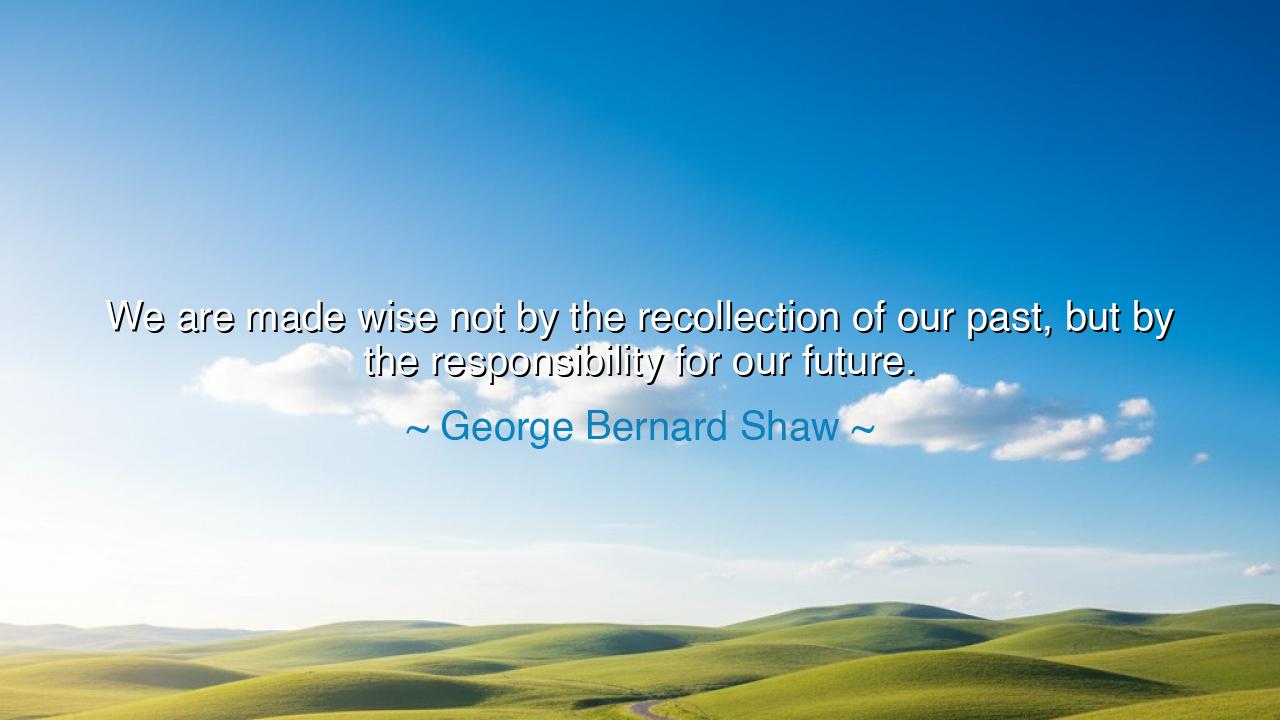
We are made wise not by the recollection of our past, but by the
We are made wise not by the recollection of our past, but by the responsibility for our future.






"We are made wise not by the recollection of our past, but by the responsibility for our future." These words by George Bernard Shaw strike at the heart of what it means to live a meaningful life. They remind us that while our past certainly shapes us, it is our actions and choices today, guided by a sense of responsibility toward the future, that truly lead to wisdom. Wisdom, Shaw suggests, is not merely a passive understanding of what has been, but an active engagement with what is yet to come. It is the commitment to creating a better future that allows us to live with purpose, clarity, and growth.
In the ancient world, the idea of responsibility toward the future was central to the great philosophers. The Greeks, particularly in the philosophy of Plato, believed that the pursuit of virtue was not simply about knowledge or past experiences, but about the choices one makes in the present and future. In his works, Plato emphasized that true wisdom lies in one’s ability to act with justice and reason, leading to the flourishing of both the individual and society. His famous Allegory of the Cave shows how individuals must look beyond the shadows of the past and reach toward the light of understanding to live a virtuous life. Similarly, Shaw’s quote underscores that true wisdom is built upon responsibility, and not on the mere reflection of the past. It is about taking control of the present to shape the future.
Consider the example of Socrates, whose life was an embodiment of moral responsibility. While many of his contemporaries focused on acquiring material wealth or fame, Socrates’ pursuit of wisdom was always directed toward a higher purpose. He encouraged his followers to question everything and to live lives of integrity, guided by an understanding of the future consequences of their actions. Socrates was not concerned with past victories or failures, but rather with living in a way that would leave a positive impact on future generations. His legacy, as a wise philosopher, was shaped not by the events of his past, but by his commitment to ethical living and the responsibility he took for the future of his society.
In a more modern context, Mahatma Gandhi offers another powerful example of the wisdom that comes from taking responsibility for the future. Gandhi’s entire philosophy was built on the idea of nonviolent resistance, a forward-thinking approach that sought to create a world of justice and peace. Gandhi did not dwell on the injustices of the past, nor did he seek vengeance for the wrongs that had been done to him and his people. Instead, he focused on how his actions could lead to a better future, where people of all races, religions, and backgrounds could live together in harmony. Gandhi’s wisdom came from his understanding that the future could only be shaped through the actions we take in the present, driven by a deep sense of moral responsibility.
The idea that wisdom comes not from the past, but from our responsibility for the future, is also reflected in the story of Nelson Mandela, who led South Africa out of the shadows of apartheid into a future of hope and equality. Mandela spent 27 years in prison, but he did not let his past bitterness cloud his vision for a united South Africa. Upon his release, instead of seeking revenge or dwelling on the injustices he had suffered, Mandela took it upon himself to lead his country toward a new future. His focus was always on the future of his people, not the scars of the past. Mandela’s wisdom was not in what he had endured, but in how he responded to the responsibility of shaping a better world for generations to come.
The lesson in Shaw’s quote is that while our past may inform us, it is the responsibility we take for the future that truly defines our wisdom. To live wisely is not to be trapped by past mistakes or successes, but to take action in the present with a clear vision for the future. As individuals, we must ask ourselves not just what we have learned, but how we can use that knowledge to create a future that aligns with our values and aspirations. Wisdom is not found in passive reflection, but in active engagement with the future—in choosing to live in a way that contributes to the well-being of those who will come after us.
In practical terms, this means looking beyond past regrets and victories and focusing on the actions we take today. We can cultivate wisdom by actively working toward the future we want to create—whether that is in our personal lives, careers, or communities. We must be mindful of how our choices affect those who will inherit the world we shape. Like Socrates, Gandhi, and Mandela, we can each take up the mantle of responsibility, living with purpose and intent as we strive to create a better future. The true test of wisdom is not how well we understand the past, but how we use that knowledge to shape the world we wish to leave behind.






AAdministratorAdministrator
Welcome, honored guests. Please leave a comment, we will respond soon